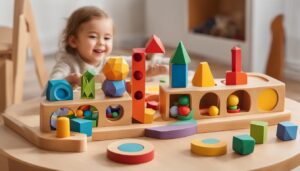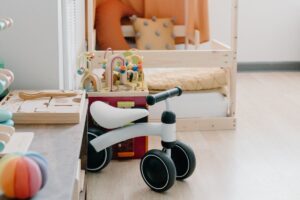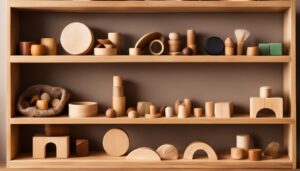Montessori toys are widely recognized for their benefits in promoting hands-on learning, independence, and creativity in children. However, it is important to consider the potential negatives or limitations of Montessori toys. While they offer many advantages, there are a few drawbacks that parents should be aware of.
Key Takeaways:
- Montessori toys can be more expensive than regular toys due to their high-quality and natural materials.
- Having too many toys, even Montessori ones, can overwhelm children and lead to distraction and fatigue.
- Montessori toys may not be accessible or affordable for all families.
- Consistent quality implementation of Montessori methods may vary across schools.
- Transitioning from Montessori education to traditional higher education can pose challenges for students.
The Drawbacks of Montessori Education
While Montessori education has many benefits, it is important to also consider its drawbacks and potential challenges. Understanding the criticisms and concerns about Montessori education can help you make informed decisions about your child’s educational journey.
Lack of Consistent Quality Implementation
One concern regarding Montessori education is the lack of consistent quality implementation across Montessori schools. Not all schools strictly adhere to the original educational methods developed by Maria Montessori, resulting in variations in the effectiveness of the approach.
Transition to Traditional Higher Education
The transition from a Montessori education to traditional higher education can pose challenges for students. Montessori students may be accustomed to independent learning and a lack of traditional academic structure, which could potentially make it harder for them to adapt to the structured environment of mainstream education.
Emphasis on Independence over Collaboration
Another criticism of Montessori education is that it may prioritize independence over collaboration. While independence is a valuable skill, some argue that Montessori classrooms may not provide enough opportunities for social interaction and teamwork, which are important skills for later stages of education and professional life.
Disadvantages for Specific Learning Styles
Like any educational approach, Montessori education may not be suitable for every child and every learning style. Some children may thrive in a more structured and traditional educational environment, and may find the self-directed and hands-on learning style of Montessori less effective. It is crucial to consider individual learning needs when evaluating educational options.
Montessori education offers unique advantages, but it is essential to acknowledge its limitations and potential drawbacks. By carefully considering these factors, you can make an informed decision about whether Montessori education is the right fit for your child.
The Limitations of Montessori Toys
While Montessori toys offer many benefits, it’s important to recognize their limitations. One limitation is that they may not cover the same wide range of themes and interests as traditional toys, which could potentially limit variety and engagement for children. While Montessori toys focus on promoting hands-on exploration and independent learning, they may require more effort and time for children to fully engage and learn from.
Families should also consider that not all households may have access to Montessori toys due to their higher cost or limited availability in certain areas. This can be a significant factor when deciding whether to incorporate Montessori toys into your child’s playtime. However, it’s worth noting that there are alternative options available, such as DIY Montessori-inspired activities that can still promote similar learning principles.
As with any educational approach, it’s essential to carefully consider and evaluate the limitations of Montessori toys. Understanding these limitations can help parents make informed decisions about the best toys and activities for their child’s development and overall learning experience.
FAQ
Q: Are there any negatives to Montessori toys?
A: While Montessori toys are generally regarded as beneficial for children’s development, they can have some drawbacks. Montessori toys can be more expensive than regular toys, and having too many toys, even Montessori ones, can overwhelm children. Additionally, Montessori toys may not be accessible or affordable for all families.
Q: What are the drawbacks of Montessori education?
A: Some drawbacks of Montessori education include variations in the implementation of the educational methods across schools, challenges in transitioning to traditional higher education, and criticisms that it may prioritize independence over collaboration.
Q: What are the limitations of Montessori toys?
A: The limitations of Montessori toys include potential lack of variety and themes compared to traditional toys, the need for more effort and time to engage and learn from them, and limited access for some families due to higher costs or limited availability.




